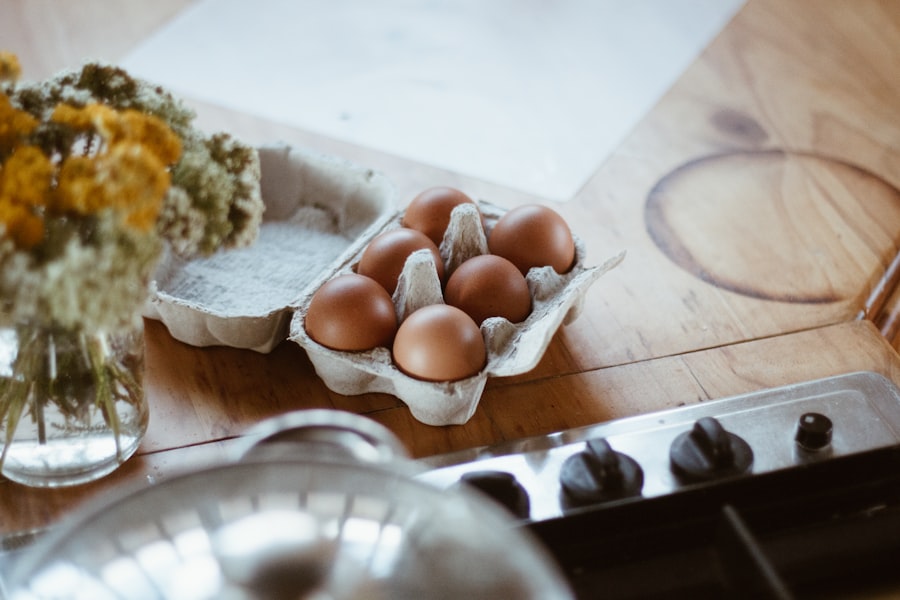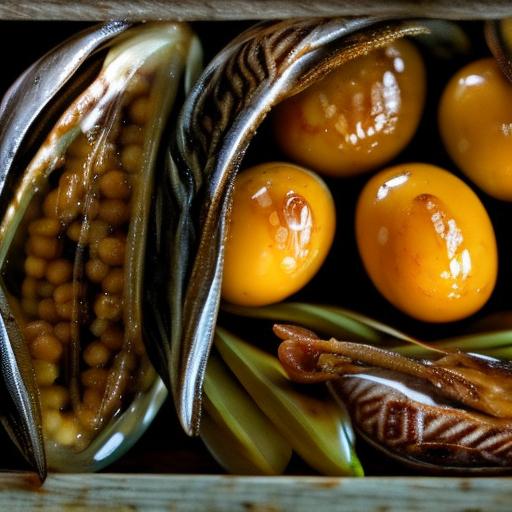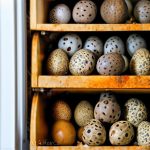Pickled quail eggs are a delightful and unique delicacy that have been enjoyed for centuries. Quail eggs are smaller than chicken eggs, making them the perfect bite-sized treat. When pickled, they take on a tangy and flavorful taste that is both satisfying and addictive. The process of pickling quail eggs involves immersing them in a brine solution made of vinegar, salt, and various spices, which infuses them with a deliciously tangy and savory flavor. Pickled quail eggs are often enjoyed as a snack or appetizer, and they can also be used to add a burst of flavor to salads, sandwiches, and other dishes. Their small size and unique flavor make them a popular choice for those looking to add a touch of gourmet flair to their meals.
Pickled quail eggs are not only delicious, but they also offer a range of health benefits. Quail eggs are packed with essential nutrients, including vitamins A, B2, and B12, as well as minerals like iron and zinc. They are also high in protein, making them a great option for those looking to boost their protein intake. The pickling process further enhances their nutritional value by adding beneficial probiotics from the fermentation process. This makes pickled quail eggs not only a tasty treat but also a healthy addition to your diet. Whether you enjoy them on their own or as part of a larger dish, pickled quail eggs are sure to add a unique and flavorful touch to your culinary repertoire.
Key Takeaways
- Pickled quail eggs are a popular delicacy known for their unique flavor and texture.
- The shelf life of pickled quail eggs is relatively long, typically lasting for several months when stored properly.
- Factors such as temperature, acidity, and proper sealing can affect the shelf life of pickled quail eggs.
- Signs of spoilage in pickled quail eggs include off-putting odor, discoloration, and unusual texture.
- Proper storage of pickled quail eggs involves keeping them refrigerated and in a tightly sealed container to maintain freshness.
- Creative ways to use pickled quail eggs include adding them to salads, charcuterie boards, or as a garnish for cocktails.
- In conclusion, pickled quail eggs can be enjoyed for an extended period when stored and handled properly, and they can add a unique touch to various dishes and drinks.
Shelf life of pickled quail eggs
The shelf life of pickled quail eggs is relatively long compared to fresh eggs, thanks to the pickling process which helps to preserve them. When stored properly, pickled quail eggs can last for several months, making them a convenient and versatile addition to your pantry. The acidity of the pickling solution creates an environment that inhibits the growth of bacteria and other microorganisms, helping to keep the eggs fresh for an extended period of time. This makes pickled quail eggs an excellent option for those looking to stock up on tasty and nutritious snacks that will last.
It’s important to note that the shelf life of pickled quail eggs can vary depending on factors such as the ingredients used in the pickling solution, the storage conditions, and the handling of the eggs. While pickled quail eggs have a relatively long shelf life, it’s still important to be mindful of signs of spoilage and to store them properly to ensure their quality and safety.
Factors affecting the shelf life of pickled quail eggs
Several factors can affect the shelf life of pickled quail eggs, including the ingredients used in the pickling solution, the storage conditions, and the handling of the eggs. The acidity of the pickling solution plays a crucial role in preserving the eggs, as it creates an environment that inhibits the growth of bacteria and other microorganisms. Vinegar is commonly used in pickling solutions for its high acidity, which helps to extend the shelf life of the eggs. Additionally, the salt content in the pickling solution also contributes to preserving the eggs by drawing out moisture and creating an inhospitable environment for bacteria.
The storage conditions of pickled quail eggs can also impact their shelf life. It’s important to store them in a cool, dark place, such as a pantry or refrigerator, to help maintain their quality and freshness. Exposure to heat, light, and moisture can accelerate spoilage, so it’s essential to store pickled quail eggs in airtight containers to protect them from these elements. Proper handling of the eggs is also crucial in preserving their shelf life. It’s important to use clean utensils and containers when handling pickled quail eggs to prevent contamination and spoilage. By paying attention to these factors, you can help ensure that your pickled quail eggs remain fresh and delicious for an extended period of time.
Signs of spoilage in pickled quail eggs
While pickled quail eggs have a relatively long shelf life, it’s important to be mindful of signs of spoilage to ensure their safety and quality. One of the most common signs of spoilage in pickled quail eggs is a change in color or appearance. If you notice any discoloration, such as darkening or cloudiness in the pickling solution or the eggs themselves, it may indicate that they have spoiled and should be discarded. Additionally, if you detect any off-putting odors coming from the pickled quail eggs, it’s best to err on the side of caution and refrain from consuming them.
Another indicator of spoilage in pickled quail eggs is the presence of mold or unusual growth on the surface of the eggs or in the pickling solution. Mold growth can pose health risks if consumed, so it’s important to discard any pickled quail eggs that show signs of mold or other unusual growth. Finally, if you notice any changes in texture or consistency, such as sliminess or mushiness in the eggs, it may indicate spoilage and should be cause for concern.
By being vigilant for these signs of spoilage, you can help ensure that your pickled quail eggs are safe to consume and enjoy. Proper storage and handling can also help minimize the risk of spoilage and extend the shelf life of your pickled quail eggs.
Proper storage of pickled quail eggs
Proper storage is essential for maintaining the quality and shelf life of pickled quail eggs. To ensure that they remain fresh and delicious for as long as possible, it’s important to store them in a cool, dark place, such as a pantry or refrigerator. Exposure to heat, light, and moisture can accelerate spoilage, so it’s crucial to protect pickled quail eggs from these elements by storing them in airtight containers. This will help maintain their flavor and texture while also minimizing the risk of contamination.
When storing pickled quail eggs in the refrigerator, it’s best to keep them on the middle or lower shelves where temperatures are more consistent. This will help prevent temperature fluctuations that can affect the quality of the eggs. It’s also important to keep them away from strong-smelling foods, as they can absorb odors easily. If you’re storing pickled quail eggs in a pantry or cupboard, make sure to choose a cool and dry spot away from direct sunlight.
Properly sealed containers are key to preserving the freshness of pickled quail eggs. Airtight jars or containers will help protect them from exposure to air and moisture, which can lead to spoilage. By following these storage guidelines, you can help ensure that your pickled quail eggs remain delicious and safe to eat for an extended period of time.
Creative ways to use pickled quail eggs

Pickled quail eggs are not only delicious on their own but also offer a range of creative ways to incorporate them into your culinary repertoire. Their tangy and savory flavor makes them a versatile ingredient that can add a burst of flavor to a variety of dishes. One popular way to enjoy pickled quail eggs is as part of a charcuterie board or antipasto platter. Their small size and unique flavor make them an ideal addition to a spread of cured meats, cheeses, olives, and other savory treats.
Pickled quail eggs can also be used to add a pop of flavor to salads and sandwiches. Simply slice them in half and add them to your favorite salad for an extra burst of tangy goodness. They also make a delicious addition to sandwiches and wraps, adding a unique twist to classic recipes.
For those looking for more adventurous ways to enjoy pickled quail eggs, they can be used as a garnish for cocktails or incorporated into hors d’oeuvres and appetizers. Their tangy flavor pairs well with savory dishes like deviled eggs or potato salad, adding an unexpected twist to familiar recipes.
In addition to being used as an ingredient in dishes, pickled quail eggs can also be enjoyed on their own as a tasty and nutritious snack. Their small size makes them perfect for snacking on straight from the jar, offering a satisfying burst of flavor in every bite.
Conclusion and tips for enjoying pickled quail eggs
In conclusion, pickled quail eggs are a delightful delicacy that offers a unique combination of tangy flavor and nutritional benefits. When stored properly, they can last for several months, making them a convenient and versatile addition to your pantry. By paying attention to factors that affect their shelf life and being mindful of signs of spoilage, you can ensure that your pickled quail eggs remain fresh and safe to eat.
To enjoy pickled quail eggs at their best, it’s important to store them in a cool, dark place in airtight containers to protect them from heat, light, and moisture. Proper handling and storage will help maintain their quality and flavor while minimizing the risk of spoilage.
Whether enjoyed on their own as a snack or incorporated into creative dishes, pickled quail eggs offer a delicious way to add a burst of flavor to your meals. From salads and sandwiches to charcuterie boards and cocktails, there are countless ways to enjoy the unique taste of pickled quail eggs. With their small size and tangy flavor, they are sure to become a favorite addition to your culinary repertoire.
If you’re interested in pickling quail eggs, you might also want to consider converting a shed into a chicken coop. This article provides valuable insights on how to repurpose a shed for your poultry needs. It’s important to have the right coop for your chickens, and understanding the best options available is crucial. Additionally, if you’re considering breeding quail, you might be curious about whether quails sit on their eggs. This article explores this topic in detail, offering helpful information for anyone interested in raising quail.
FAQs
How long can you keep pickled quail eggs?
Pickled quail eggs can be kept for up to 1 to 3 months if stored properly in the refrigerator.
What is the best way to store pickled quail eggs?
The best way to store pickled quail eggs is to keep them in an airtight container in the refrigerator.
Can pickled quail eggs be stored at room temperature?
It is not recommended to store pickled quail eggs at room temperature as they can spoil quickly. It is best to keep them refrigerated.
How can you tell if pickled quail eggs have gone bad?
If pickled quail eggs develop an off smell, unusual color, or slimy texture, they have likely gone bad and should be discarded.
Can pickled quail eggs be frozen for long-term storage?
It is not recommended to freeze pickled quail eggs as the texture and flavor may be compromised. It is best to consume them within the recommended storage time in the refrigerator.
Meet Walter, the feathered-friend fanatic of Florida! Nestled in the sunshine state, Walter struts through life with his feathered companions, clucking his way to happiness. With a coop that’s fancier than a five-star hotel, he’s the Don Juan of the chicken world. When he’s not teaching his hens to do the cha-cha, you’ll find him in a heated debate with his prized rooster, Sir Clucks-a-Lot. Walter’s poultry passion is no yolk; he’s the sunny-side-up guy you never knew you needed in your flock of friends!







